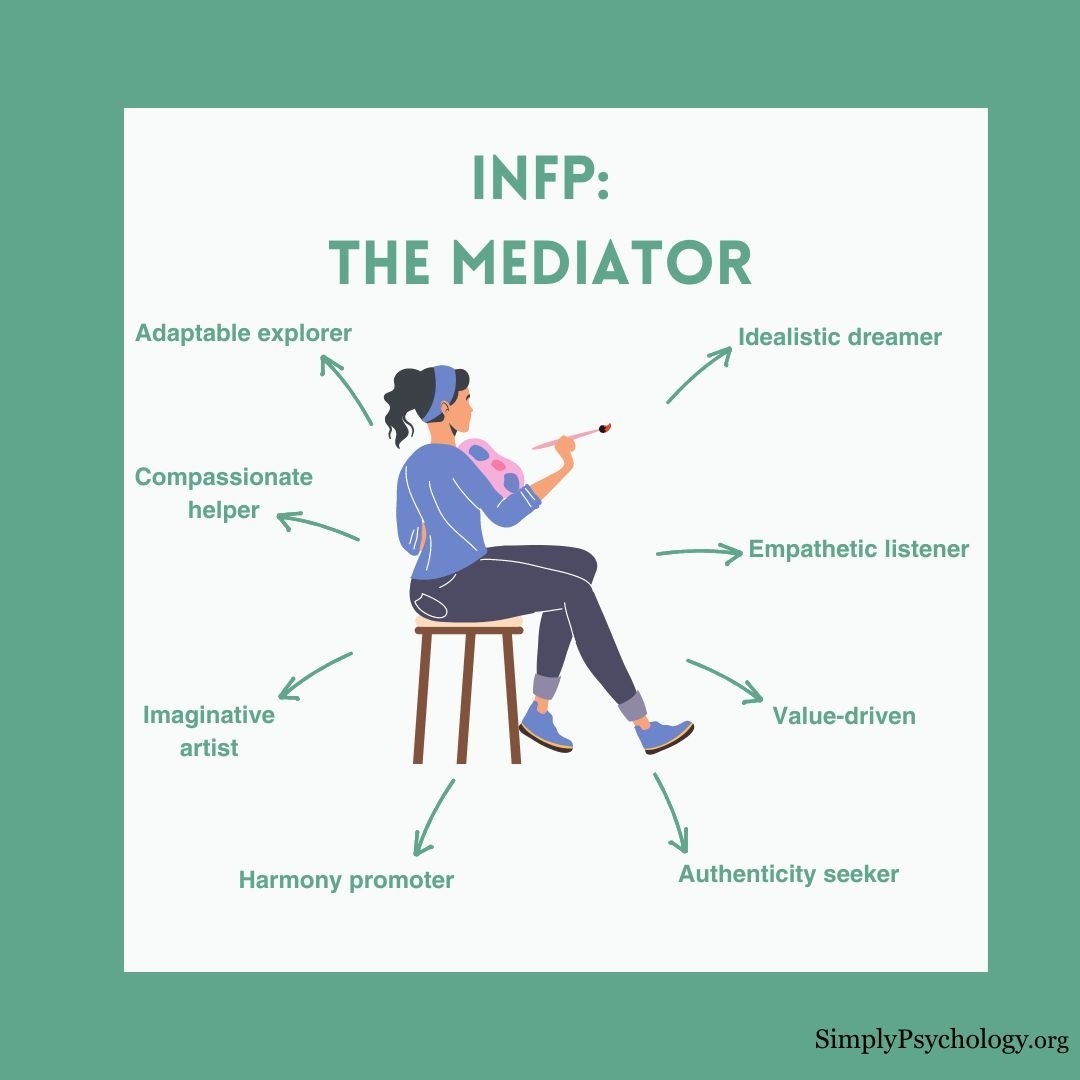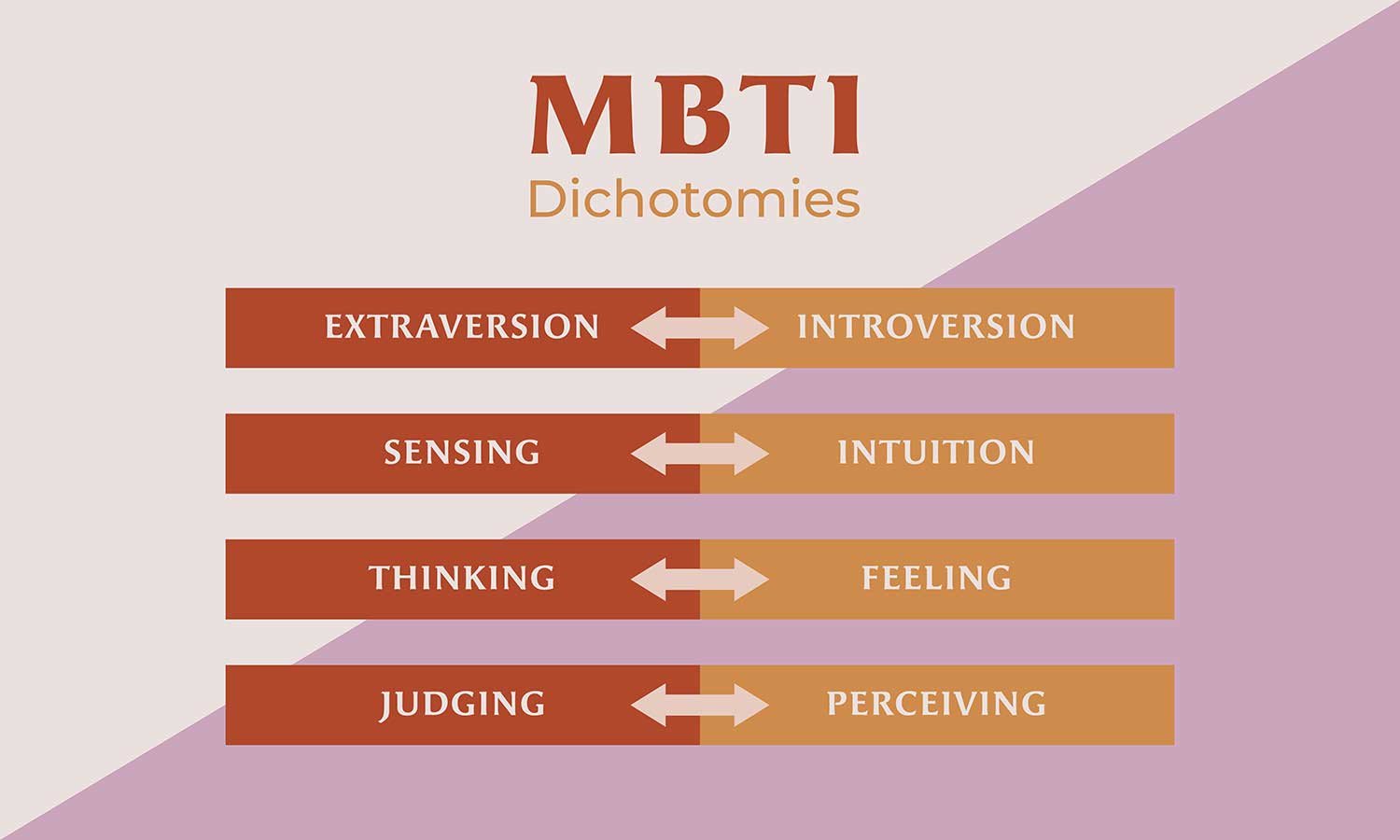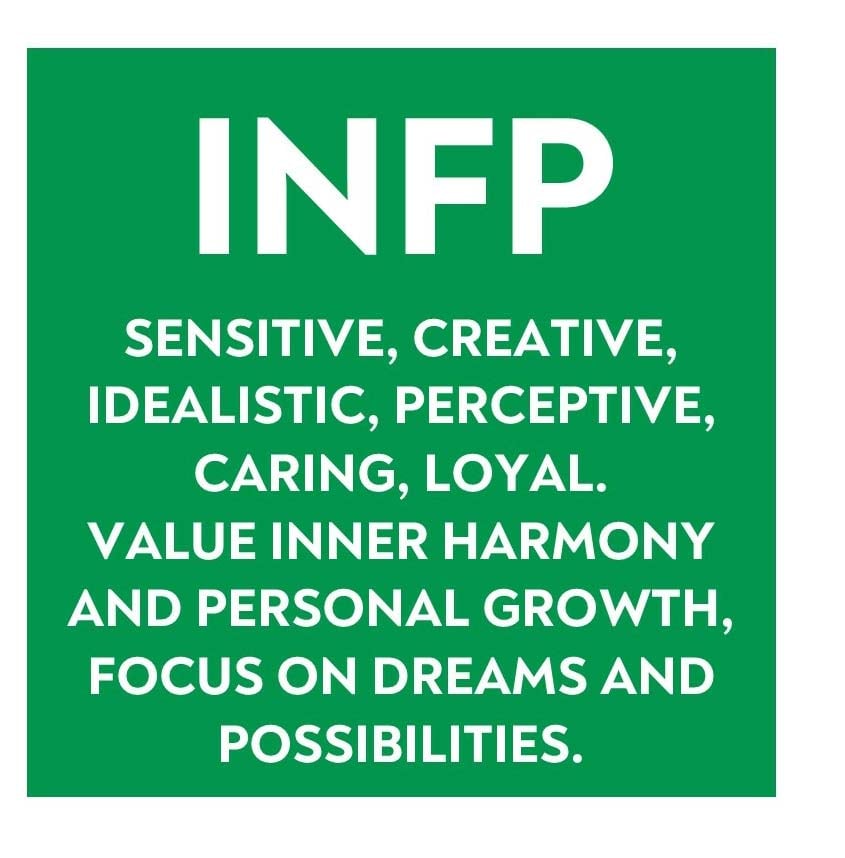What does INFP stand for?
INFP, according to the Myers-Briggs Type Indicator (MBTI), stands for Introversion, Intuition, Feeling, and Perceiving. INFPs are introspective, intuitive, empathetic, and flexible, often characterized by their idealism, creativity, open-mindedness, and strong personal value systems.
INFP Meaning
INFPs gain energy from solitude (Introversion), favor conceptual thinking and potential outcomes over concrete realities (Intuition), base decisions on emotional considerations and personal values rather than detached analysis (Feeling), and appreciate adaptability and open-ended experiences over fixed plans (Perceiving).
People with this personality type tend to be creative, idealistic, caring, and loyal. They have high values and morals and are constantly seeking ways to understand people and best serve humanity.
They are family and home-oriented and prefer to interact with a select group of close friends. INFPs are sometimes referred to as “the Mediator,” “the Idealist,” “the Healer,” or “the Dreamer.” ESTJ is the opposite personality type of INFP.

INFP is the ninth most common type in the population. INFPs make up:
- 4% of the general population
- 4% of men
- 5% of women
Famous INFPs include Princess Diana, William Shakespeare, Helen Keller, Audrey Hepburn, and Isabel Briggs Myers (the creator of the Myers-Briggs Type Indicator).
| Strengths | Weaknesses |
|---|---|
| Value close relationships | Difficult to get to know |
| Compassionate | Self-critical |
| Open-Minded | Unfocused |
| Non-judgmental | Desperate to please others |
INFP Characteristics
INFPs are driven by high values and moral integrity
- They tend to make choices based on personal feelings and their conscience rather than logic and objective information.
- They will not compromise their ethical standards for personal benefit and have a strong commitment to authenticity and sincerity.
- ISFPs are deeply reflective and hold a desire to live a meaningful, purpose-filled life.
INFPs are idealists
- They care deeply about the personal growth and development of others and strive to make a positive impact on the lives of other people in any way they can.
- They are constantly encouraging each person to find their own path and expand their horizons, and they strongly believe in the unlimited potential of others.
- They enjoy exploring their purpose in life and utilizing their skills and knowledge to serve humanity.
INFPs are introverted individuals
- They tend to be quiet and reserved, generating energy from time spent alone. Social situations can be draining for INFPs so they prefer to socialize with small and select groups of friends.
- They long for close, meaningful relationships where they can provide comfort and support.
Empathy is another central feature of the INFP personality
- INFPs care deeply for others and are highly sensitive to other people’s emotions. They are perceptive, thoughtful, and kind-hearted individuals who acquire joy from seeing the successes of others.
- Because they are so accepting, INFPs are often the confidants of their friends and loved ones, and they can always be counted on for positive encouragement or a shoulder to cry on.
- They are capable of great self-sacrifice, occasionally feeling empathy even for those who have done wrong.
INFPs are creative and have a unique talent for self-expression
- They are highly imaginative and love to see things from unconventional perspectives.
- They are visionaries, allowing their minds to run freely and fantasize about the meaning and purpose of life.
- They are drawn to creative, emotional pursuits such as music, art, literature, and poetry.
Cognitive Functions of an INFP
The MBTI suggests that the four different cognitive functions (thinking, feeling, intuition, and sensing) form a hierarchy where each function is either directed outwardly (extroverted) or inwardly (introverted). The order of these functions determines one’s personality.

The dominant function is the primary aspect of personality, while the auxiliary and tertiary functions play supportive roles.
Dominant: Introverted Thinking
- INFPs process most of their emotions and thoughts internally.
- They feel strongly and possess great compassion and empathy for others, but, as introverts, they tend not to express these sentiments outwardly.
Auxiliary: Extraverted Intuition
- INFPs have creative imaginations, exploring the “what if” scenarios and dreaming up all sorts of ideas and possibilities before making decisions.
- They engage with the world around them using their strong sense of intuition and following their moral conscience.
- They focus on the bigger picture in order to live a purpose-filled life and make meaningful changes in their surrounding environment.
Tertiary: Introverted Sensing
- When taking in information from the world around them, INFPs are able to form vivid memories of these events.
- They can then analyze these experiences and relive them when they are in quieter, relaxed settings.
Inferior: Extraverted Thinking
- This function of the INFP personality is largely unconscious, but still exerts some influence when faced with pressure.
- This cognitive function involves making sense of the world in an organized and logical way.
- In times of stress, INFPs can be detail-oriented and structured with a focus on objective information rather than emotional.
INFP Hobbies, Interests, and Careers
As artistic and spiritual individuals, INFPs are typically found in careers that allow them to express their creativity and pursue their own visions. Many INFPs dream of becoming writers, composers, artists, or designers.
INFPs also have strong personal values and a sincere desire to connect with and help other people. They enjoy working in professions where they can bring their kindness and empathy to others. Because of this, individuals with this personality type often choose careers focused on service, such as counseling, nursing, psychology, social work, or therapy.
In their free time, INFPs enjoy pursuing hobbies like poetry, creative writing, music, photography, theater, and visual art. They also tend to be quite successful in learning foreign languages.
INFP Work Environments
INFPs enjoy working in harmonious, supportive environments. They want to be given the independence and flexibility to pursue their own interests and immerse themselves in personally meaningful tasks.
They prefer to work autonomously, unconstrained by rules and regulations and with the freedom to make their own rules and do things their own way.
INFPs are hard workers, but they can become demotivated if they are pressured, micromanaged, or criticized.
When working with others, it is important to an INFP that their co-workers are cooperative, supportive, and in tune with their same values. INFPs prefer to care for and support others, rather than work alongside them.
They tend to be the most devoted to tasks with a clear meaning and purpose which is why they make excellent nurses and psychologists.
INFPs want to be in a workplace where they can have the opportunity to contribute to making a real difference and changing someone’s life for the better.
INFP Personal Relationships
People with this personality type are introverted, so they can be difficult to get to know. They do not take pleasure in superficial, casual relationships, but rather, they crave deep, meaningful connections.
They are able to shed their insecurities and be their truest selves in the company of their closest friends and family. INFPs feel the most fulfillment from being there for someone they care about.
They are deeply committed to their intimate circle and they tend to be faithful and attentive to the people they love. They enjoy dedicating themselves to helping their friends and partners improve their lives and pursue their goals.
INFPs are dreamers and idealists when it comes to their relationships, especially romantic ones, so it is not always easy for them to make friends or find true love.
They tend to have high expectations for an ideal partner and are usually only drawn to those with shared values.
When an INFP develops a relationship with someone who fulfills this idealized image of a perfect partner or friend, they secretly hope to stay close to that person for life.
Tips for Interacting With INFPs
Friendships
Because INFPs only forge deep friendships with a select number of people, they place a lot of value on these relationships. INFPs crave personal and emotional intimacy, but social contact can be difficult and they often struggle to share their own feelings with others.
It can be challenging to get to know an INFP, but the rewards of these friendships are worth the patience and time.
Relationships
Similarly, INFPs can struggle to become close romantic partners, but they will also approach these relationships with a strong sense of loyalty and commitment.
They tend to hold overly romanticized views of their relationships, carrying with them a vision of their ideal soulmate. When they do fall in love, INFPs are devoted, loyal partners who are willing to put a great deal of effort into their relationships and place the happiness of their partners over that of themselves.
As the partner of an INFP, it is important to be patient and understanding as they may struggle to open up. INFPs also need plenty of freedom and independence to explore life and pursue greater self-awareness.
INFPs can be overly sensitive to criticism, but they will always promote harmony over conflict.
Parenting
As parents, INFPs are caring, supportive, and warm. They do not tend to establish strict rules, but rather give their children the independence to make their own decisions, form their own opinions, discover their own interests, and grow as individuals.
They care about helping their children develop strong values and about guiding them towards fulfillment and happiness.
INFP parents are good at creating harmonious and accepting home environments where their children feel loved and supported.
Test
Answer these questions to find out if INFP might be your personality type:
- Do you prefer spending time alone or with a small group of close friends rather than in large social gatherings?
- Are you more drawn to abstract ideas and possibilities than concrete facts and details?
- When making decisions, do you rely more on your personal values and feelings than on logical analysis?
- Do you prefer flexibility and spontaneity over strict schedules and plans?
- Are you often described as idealistic, creative, or empathetic by others?
- Do you have a strong desire to help others and make a positive impact on the world?
- Are you deeply in touch with your emotions and those of others?
- Do you enjoy exploring your inner world of thoughts and feelings?
- Are you drawn to creative pursuits such as writing, art, or music?
- Do you value authenticity and strive to stay true to your beliefs and values?
If you answer “yes” to most of these questions, you may have INFP personality traits. However, remember that personality is complex, and a professional assessment would be needed for a definitive personality type determination.
Take the MBTI (Paper Version)
FAQS
What is an INFP person like?
What is an INFP An INFP person, characterized by Introverted (I), Intuitive (N), Feeling (F), and Perceiving (P) preferences within the Myers-Briggs Type Indicator, is empathetic, idealistic, and introspective.
They are deeply in tune with their emotions and values, often driven by a strong sense of purpose and desire to make a positive impact on the world. INFPs are creative, imaginative, and enjoy exploring abstract ideas and concepts.
They may appear reserved in social situations but are passionate and caring with those they trust. INFPs can struggle with practical tasks and decision-making, as they tend to prioritize emotions and personal values over logic.
Do INFP and INFJ get along?
INFP and INFJ generally get along well, as they share many similarities in terms of their introverted, intuitive, and feeling preferences. Both types are empathetic, introspective, and driven by a strong sense of purpose, which can create a deep understanding and connection between them. They tend to value meaningful conversations and share a desire to make a positive impact on the world.
However, differences in their judging (J) and perceiving (P) preferences can lead to potential challenges. INFJs are more structured and organized, while INFPs prefer flexibility and spontaneity.
Understanding and respecting each other’s preferences can help maintain harmony and foster a supportive and enriching relationship.
Is INFP a rare personality?
Yes, the INFP personality type is considered rare, as it makes up only around 4-5% of the general population. This introverted, intuitive, feeling, and perceiving type is known for its empathetic nature, strong values, and creative approach to life.
Despite being a minority, INFPs can have a significant impact on the world around them due to their idealism, passion, and strong sense of purpose.
Sources
King, S. P., & Mason, B. A. (2020). Myers‐Briggs Type Indicator. The Wiley Encyclopedia of Personality and Individual Differences: Measurement and Assessment, 315-319.
Myers, I. B. (1962). The Myers-Briggs Type Indicator: Manual (1962).
Myers, K. D., & Kirby, L. D. (2015). Introduction to type: A guide to understanding your results on the MBTI assessment. Sunnyvale, CA: CPP.
Myers-Briggs Type Indicator. (2019, May 28). New World Encyclopedia, Retrieved from https://www.newworldencyclopedia.org/p/index.php?title=Myers-Briggs_Type_Indicator&oldid=1020015.
Myers, Isabel B.; Myers, Peter B. (1995) [1980]. Gifts Differing: Understanding Personality Type. Mountain View, CA: Davies-Black Publishing. ISBN 978-0-89106-074-1.
Pittenger, D. J. (2005). Cautionary Comments Regarding the Myers-Briggs Type Indicator. Consulting Psychology Journal: Practice and Research, 57(3), 210-221.
The purpose of the Myers-Briggs Type Indicator®. The Myers & Briggs Foundation: MBTI Basics. (n.d.). Retrieved from https://www.myersbriggs.org/my-mbti-personality-type/mbti-basics/


